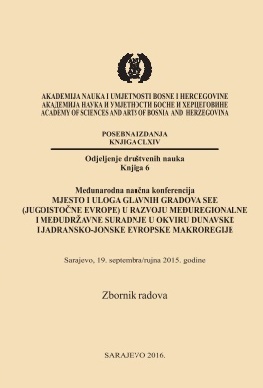The city of Sarajevo as the focal point of the development of spatial planning
Grad Sarajevo kao fokusna tačka razvoja prostornog planiranja
Author(s): Rahman NurkovićSubject(s): Social Sciences, Geography, Regional studies, Sociology, Social development, Policy, planning, forecast and speculation, Rural and urban sociology, Economic development
Published by: Akademija Nauka i Umjetnosti Bosne i Hercegovine
Keywords: city of Sarajevo; functions; development; human resources; physical planning
Summary/Abstract: This paper analyzes the city of Sarajevo as the focal point of the development of spatial plan¬ning. Thanks to its functions, the city of Sarajevo has, as often stressed, a focal significance in spatial planning. With the development of different branches of production activities, pri¬marily industry and the production of handicrafts, cities organize the production of a variety of goods, not only within their borders but also in the wider surrounding area. A city is a specific form of human population whose size maintains the meaning of its functions in the area. In accordance with the socio-economic and other factors of development, the forms and dynamics of spatial planning of cities are different. In the city of Sarajevo, there are all the basic functions of human life (living in the community, working, supplying oneself, educat¬ing oneself, having leisure activities, and transport and communications) which affects the rapid changes in the appearance, structure and functions of spatial components. Based on the above facts, it can be seen that the area of influence of the city of Sarajevo can be differenti¬ated into zones of varying degrees of socio-economic transformation and zones of functional connections with the city. This question is given a high priority in the world, as evidenced by the large number of scientific papers. In this paper, the attention will be devoted to the development as the focal point of regional planning of Sarajevo and its surroundings. Spatial planning is one of the most important contemporary features of the world. Space manage¬ment makes it an essential element of rational and humane use of space and organization of vital functions, adjusting the planning with technical and technological development as a phenomenon of our times and the necessities of life of the population. Spatial planning is carried out on the basis of spatial and urban planning.This kind of spatial planning is the result of pronounced differences in development and lifestyle between cities and villages, hence there is the intense migration of population from rural areas to the city of Sarajevo. The increase in urban population ranges mostly within the dynamics of growth of the total population. The focus of spatial planning in terms of concen¬tration of population, jobs and housing developments is moved to the edges and the suburban areas of Sarajevo. There also occur changes in the structure of population and degree of urbanization of Sarajevo from year to year. This primarily relates to the separation of urban settlements. It was therefore necessary to allocate these places according to the model which gives a more realistic picture of the number of urban settlements and the share of the urban population.
Journal: Posebna izdanja Akademije nauka i umjetnosti BiH
- Issue Year: 2016
- Issue No: 1
- Page Range: 230-247
- Page Count: 18
- Language: English

